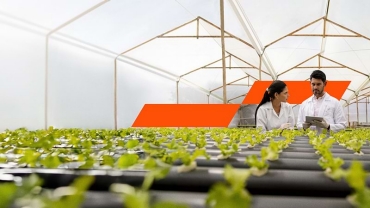
A new era calls for a new perspective on food
15/06/20
Healthy food
In one fell swoop the corona pandemic has ground our lives to a halt. Schools were shut, working from home became the new normal and ‘just popping out to the supermarket’ also took on a new dimension. ‘This crisis is an excellent opportunity to reconsider our way of living and eating’, says Bert Graafsma, Agrifood industry leader at PwC. 'Bad eating habits will cost our society dearly in the longer term. Being more careful about what we eat will help us move towards a more sustainable future.’

Changing dietary patterns
‘What makes changing eating habits so complicated is that food is part of our culture. It often takes generations before habits show signs of change,’ says Bert Graafsma. ‘Moreover, a number of studies have shown that forcing people to eat differently actually does not work or even has the opposite effect. Food is therefore a highly sensitive issue and the drive to change really must come from consumers themselves. The past few years have seen growing calls for healthier and more varied food that moreover is affordable. Take, for example, calls for more vegetables and fruit, less meat, but also the demand for products with less or no sugar. These products have entered the market thanks to consumer demand. Millennials, in particular, are paving the way towards different eating patterns. They are a very conscious group who more often than not advocate a more sustainable world. And needless to say, healthy eating is part and parcel of that.'
Short and long-term costs
Yet not all consumers make equally conscious decisions when it comes to what they eat. ‘A major factor for buying certain food is what it costs the consumer at the end of the day,’ says Graafsma. ‘More often than not, a cheap product is an unhealthy product, but we are stimulated - precisely by the low price or by special offers - to buy (and continue buying) these products. And of course not everyone is in a position to opt for the more expensive variant. Money is and remains an important factor in what someone eventually decides to put in their shopping basket.'
Graafsma explains that while choosing unhealthy, low-cost options may be cheaper in the short term, the long-term costs will be much higher if we continue to purchase and consume unhealthy food. ‘Unhealthy eating patterns leave people with less energy and more prone to medical problems, resulting in high costs for both the person in question and society as a whole. Making healthier products relatively cheaper or promoting them more actively would send out the right signals for consumers to actually purchase these products. With a healthier lifestyle as the end-result.'
A joint approach for a healthy lifestyle
‘The will of a conscious millennial or even of a conscious producer is not enough to reverse the trend of unhealthy eating habits,’ Graafsma continues. ‘The government and the business community also have a role, as do knowledge institutes. If we can get these organisations and the consumer on the same page, we will be heading in the right direction. The government can play a role in informing the public and promoting healthy food, while obtaining advice from knowledge institutes as to what precisely is and is not healthy. This could result in guidelines, for example, that producers must follow so that consumers can effortlessly get the products they want and live a healthy lifestyle. It really is an interaction between these four players. If one refuses to cooperate, it becomes pretty complicated.'

Healthy food publication
Want to find out more about the production of food and how we can break the cycle of unhealthy food consumption? Read our publication
Contact us




















